移动式肉羊饲喂装置设计(含CAD装配图,PROE三维图)
无需注册登录,支付后按照提示操作即可获取该资料.
移动式肉羊饲喂装置设计(含CAD装配图,PROE三维图)(设计说明书14000字,CAD图2张,PROE三维图)
摘 要
随着社会的不断发展,新科技新产品层出不穷,作为基础产业的农业与畜牧业,也在科技创新的潮流中不断壮大。畜牧业的发展需要特定的天然条件,所以,在我国,畜牧业的发展主要在北方,新疆与内蒙等地。因为以上地方拥有大量的草原与平原可以供畜牧业的发展。但是,随着我国人口不断的扩大以及百姓生活对肉食的需求量的增加,畜牧业仅靠放养是不够填补大量的市场空白的,所以,集中式养殖成为了畜牧业发展的最优模式,对于集中式养殖的畜牧业,对牲畜的吃喝拉撒就需要给予保障。以往,对于集中式养殖的喂养大多靠人工定时定量投喂。对于喂食的量既不科学,也耗费人工。随着牲畜数量的增加,人工的劳动成本也在显著的上升。所以,机械化的科学养殖也成为了畜牧业发展必要的一环。
本文所设计的移动式自动饲喂装置就是机械化养殖的其中一种,这种设备不同于大型设备与机械管理。这种设备主打就是结构简单,经济投入低,见效快。适合家庭作坊式的小型畜牧产业使用。移动式自动饲喂装置是搭载在电动三轮车上的一套饲喂装置,这种装置可以根据牲畜的数量与料槽的大小手动调整出料的速度,工人只需要骑着三轮车在畜牧场走一圈既可以完成加料。可以节省大量的时间与人工劳动。是科学代替生产力的完美体现。
本文主要对移动式自动饲喂装置内部的出料绞龙,传动带以及其传动装置进行设计与校核。
关键词:饲喂、自动化、畜牧业
Abstract
With the continuous development of society, new technologies and new products are emerging in an endless stream. As a basic industry, agriculture and animal husbandry are also growing in the trend of technological innovation. The development of animal husbandry requires specific natural conditions, so in China, the development of animal husbandry is mainly in the north, Xinjiang, Inner Mongolia, and other places. Because the above places have a large number of grasslands and plains for the development of animal husbandry. However, with the continuous expansion of China's population and the increasing demand for meat in people's lives, livestock farming alone cannot fill a large number of market gaps. Therefore, centralized farming has become the optimal model for the development of animal husbandry. For centralized farming, it is necessary to provide protection for the food and drink of livestock. In the past, the feeding of centralized aquaculture mostly relied on artificial timed and quantitative feeding. The amount of feeding is neither scientific nor labor intensive. As the number of livestock increases, the labor cost of labor is also significantly increasing. Therefore, mechanized and scientific breeding has also become a necessary part of the development of animal husbandry.
The mobile automatic feeding device designed in this article is one of the types of mechanized farming, which is different from large-scale equipment and mechanical management. The main features of this equipment are simple structure, low economic investment, and quick efficiency. Suitable for small livestock industry using family workshops. The mobile automatic feeding device is a set of feeding devices mounted on an electric tricycle. This device can manually adjust the feeding speed based on the number of livestock and the size of the feed chute. Workers only need to ride the tricycle around the livestock farm to complete feeding. It can save a lot of time and labor. It is the perfect embodiment of science replacing productivity.
This article mainly designs and checks the discharge auger, transmission belt, and its transmission device inside the mobile automatic feeding device.
Keywords: feeding, automation, animal husbandry
本文设计的移动式肉羊饲喂装置可以容纳的饲料质量为540kg,按照饲料的密度180kg/m3,同时羊舍的走廊宽度为1.7米,这里将料箱的宽度设定为1.5米,加上小车的轮胎外宽。可以使小车正好走过羊舍的走廊宽度。因为肉羊的单次采食量需要1.4kg,羊舍共有200只羊,一次性就需要投喂280kg饲料。料箱整体尺寸设计可以容纳360kg饲料,小车可以满足肉羊场的喂养需求。
本文资料提供撒料的速度为3.92kg/s-5.44kg/s。羊舍共长100米,需要撒料大于280kg,这里按照最低撒料速度计算,车辆需要在羊舍中行走71.5s才可以完成所有的撒料。所以小车的行走速度为1.4m/s就可以满足饲喂装置使用要求。
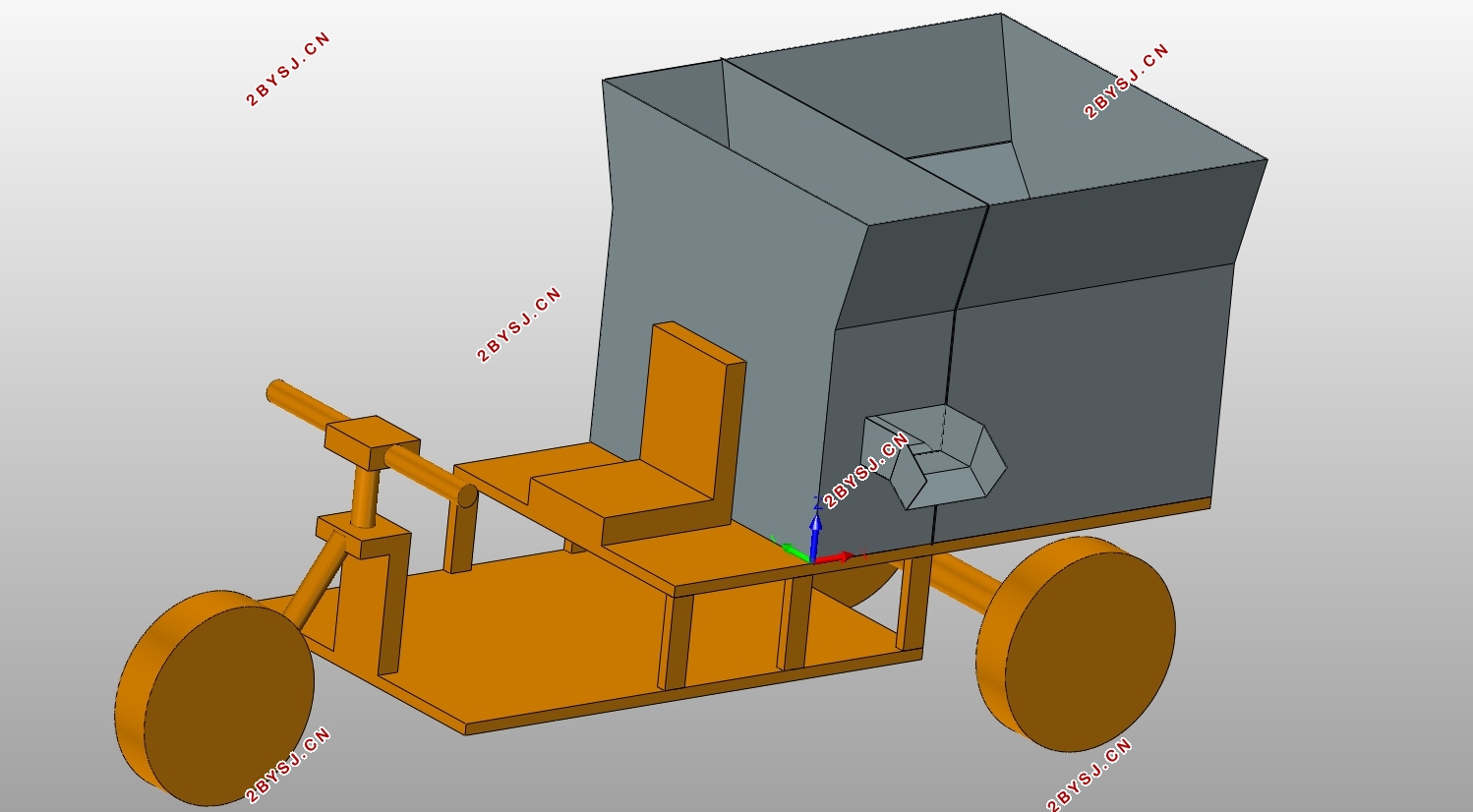
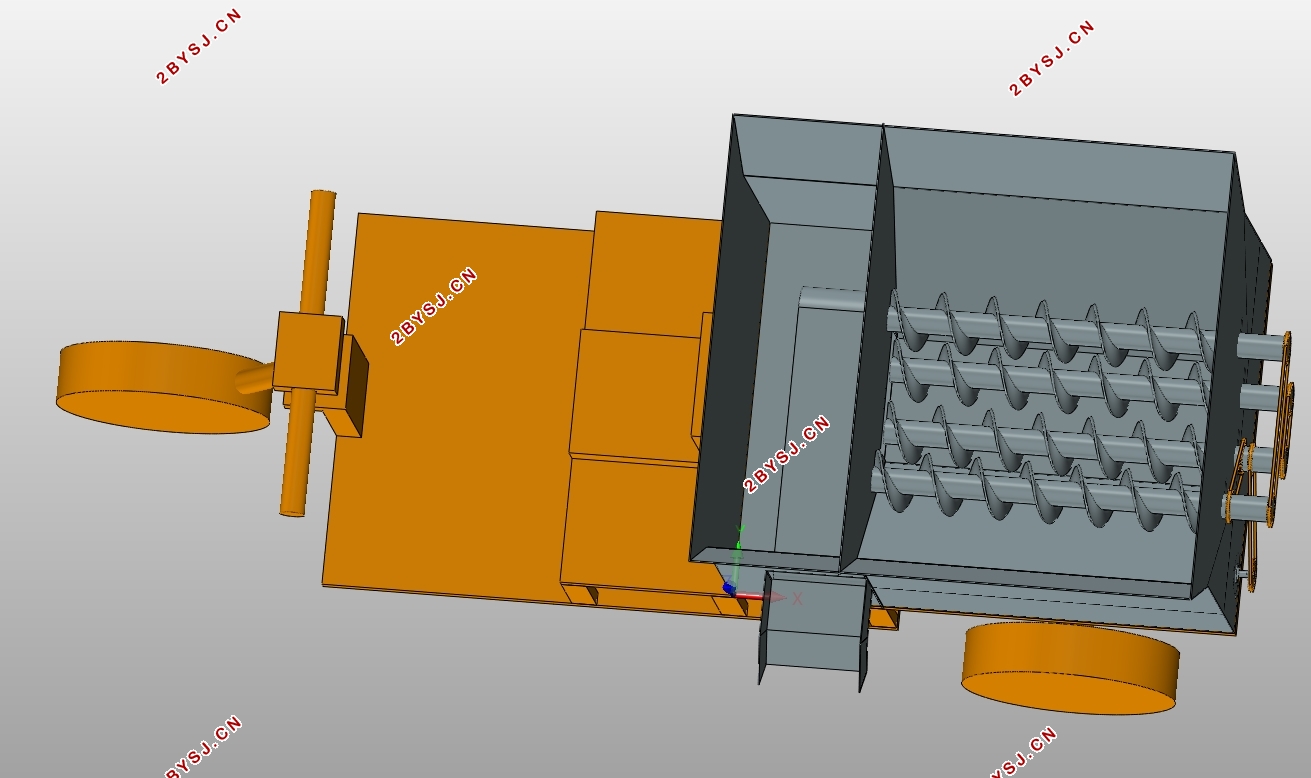
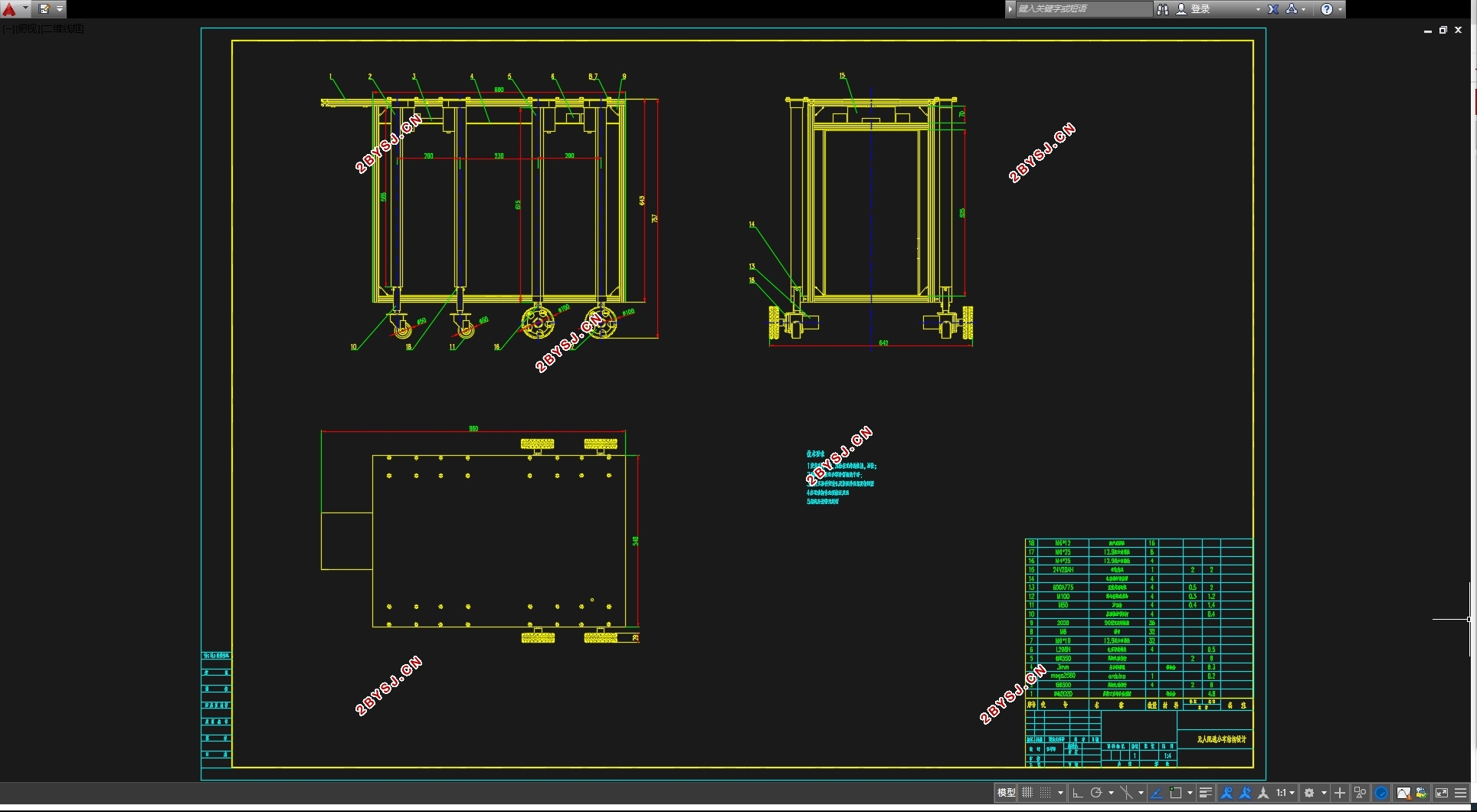
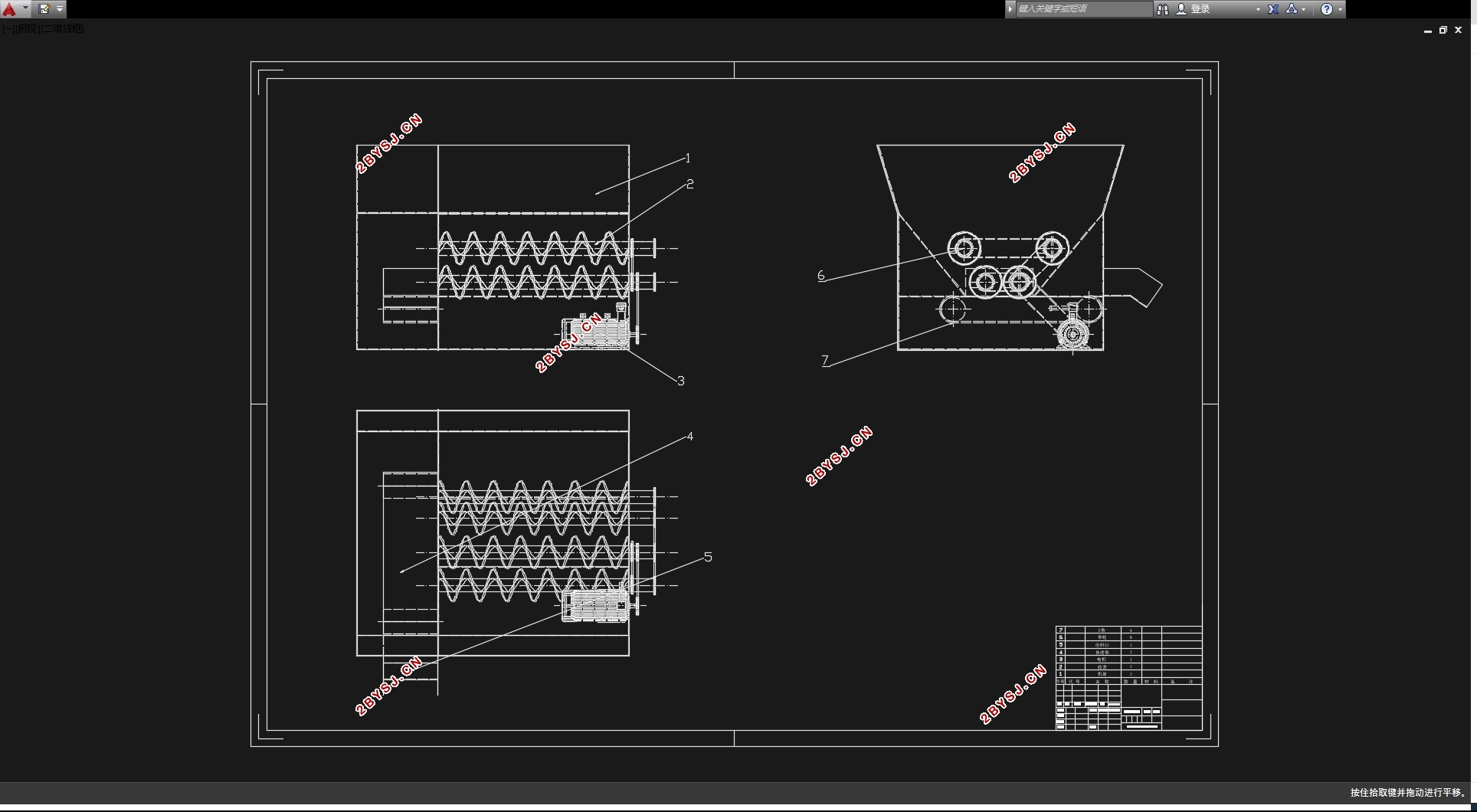
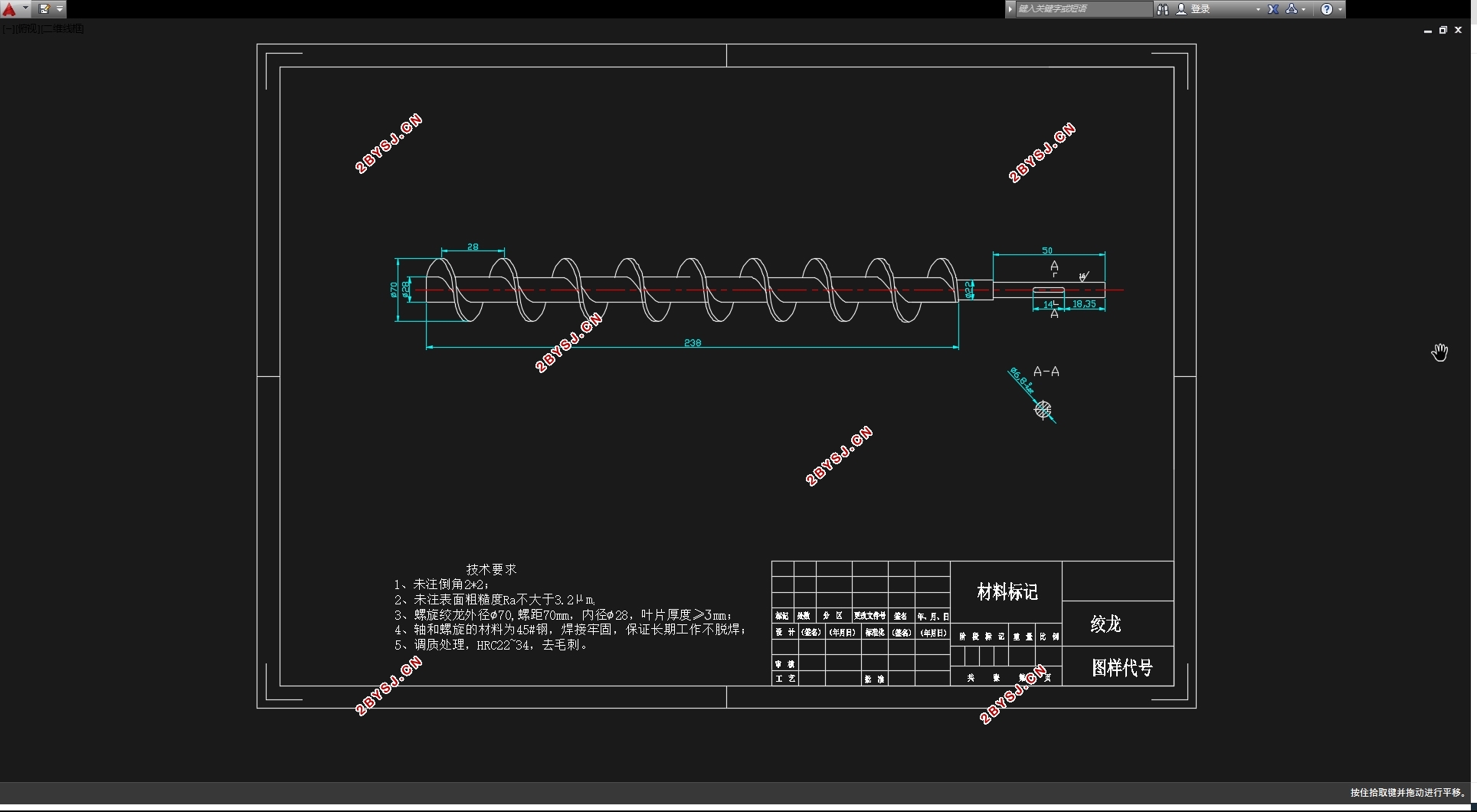
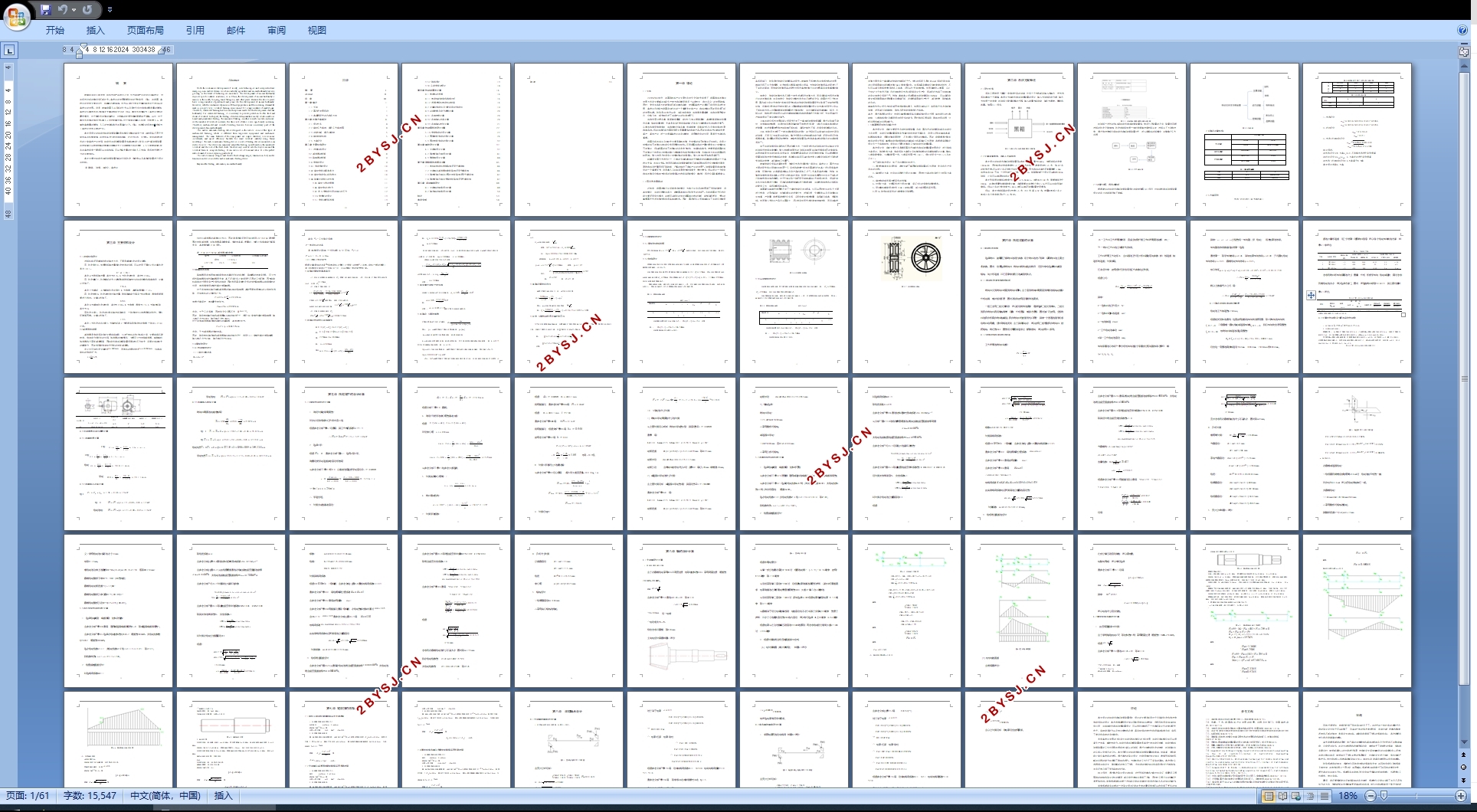
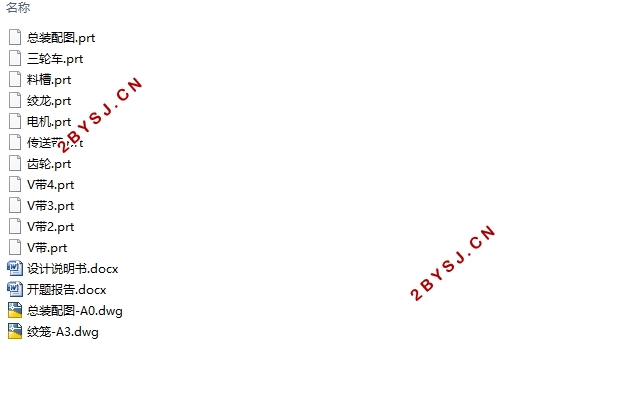
目录
摘 要 I
Abstract II
目 录 III
第一章 绪论 1
1.1 引言 1
1.2 国内外发展现状 1
1.3 本课题研究的内容及方法 3
第二章 总体方案概述 4
2.1 设计任务 4
2.2 确定工艺路线,画出工艺路线图 4
2.3 功能分解,画出功能树 5
2.4 确定功能机构 5
2.5 方案评价 6
第三章 主要机构设计 8
3.1 送料机构设计 8
3.2减速器的选择 8
3.3联轴器的选择 9
3.4 带轮的设计 9
3.4.1 传动带的设计 10
3.4.2确定带轮的基准直径 10
3.4.3确定传动中心距和带长 10
3.4.4验算主动轮上的包角 11
3.4.5确定V带的根数 11
3.4.6确定带的初拉力 12
3.4.7求V带传动作用在轴上的压力 12
3.5 V带带轮的设计 13
3.5.1 带轮的材料选择 13
3.5.2 结构设计 13
3.5.3从动带轮的设计 14
第四章 传动装置的计算 16
4.1 电动机的选择 16
4.1.1 电动机的类型和结构分析 16
4.1.2 选择送料机电动机的功率 16
4.2 计算总传动比及分配各级的传动比 19
4.3 运动参数及动力参数计算 20
4.3.1 各轴转速计算 20
4.3.2 各轴输入功率计算 20
4.3.3 各轴输入转矩计算 21
第五章 传动零件的设计计算 22
5.1 V带轮传动的设计计算 22
5.2 圆锥齿轮传动的设计计算 26
5.3 圆柱齿轮传动的设计计算 32
第六章 轴的设计计算 37
6.1 主动轴设计计算 37
6.2 锥齿轮输出轴设计计算 41
6.3 惰轮轴设计计算 44
第七章 键联接的选择及计算 45
7.1 电机与电动机带轮联接采用平键连接 46
7.2 主动轴与减速器机带轮联接采用平键连接 46
7.3 锥齿轮输出轴与小圆柱齿轮联接采用平键连接 47
7.4 锥齿轮输出轴与大锥齿轮联接采用平键连接 47
第八章 滚动轴承设计 48
8.1 主动轴的轴承设计计算 48
8.2 输出轴的轴承设计计算 50
结论 53
参考文献 54
致 谢 55
